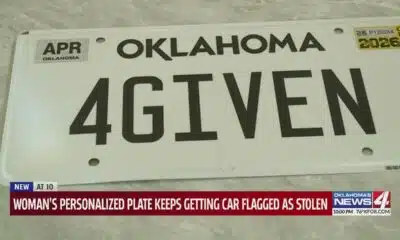News from the South - Tennessee News Feed
'Flying blind': Tennessee won't track existing private school students who receive vouchers
SUMMARY: Tennessee’s new Education Freedom Scholarship (EFS) program faces criticism for not tracking students’ previous enrollment, making it unclear how many publicly funded vouchers aid current private school students. Rep. Caleb Hemmer calls the program “flying blind,” highlighting a lack of transparency and accountability. Critics note the $7,295 scholarships don’t cover full private tuition, likely benefiting families already in private schools; the bill’s fiscal note estimates 65% of vouchers will go to those students. Unlike states like Florida or North Carolina, Tennessee law doesn’t require tracking this data, raising concerns over transparency and effective use of $125 million taxpayer funds.
The post 'Flying blind': Tennessee won't track existing private school students who receive vouchers appeared first on www.wkrn.com
News from the South - Tennessee News Feed
Man charged in connection to shooting outside Cache 42 that killed recent high school grad
SUMMARY: A 24-year-old man, Gerard Lawson, was arrested in connection with a deadly shooting outside Cache 42 on Hacks Cross Road that killed 18-year-old Cornelius Otis Jr. and injured others. Lawson faces three counts of attempted first-degree murder. Otis’s mother expressed heartbreak but relief that charges were filed. Lawson has a prior aggravated assault charge from 2021 for shooting at a woman in her car, raising concerns about his prior release. The community is frustrated over ongoing violence and perceived leniency toward serious offenders. Otis’s funeral is scheduled for the weekend, and further arrests are anticipated.
Two and a half weeks later, the Shelby County Sheriff’s Office announced Thursday an arrest in a shooting outside the popular restaurant Cache 42 that killed recent 18-year-old high school grad Cornelius Otis Jr. and injured two other people.
ABOUT FOX13 MEMPHIS:
FOX13 Memphis is your home for breaking news, live video, traffic, weather and your guide to everything local for the Mid-South.
CONNECT WITH FOX 13 MEMPHIS:
Visit the FOX13 Memphis WEBSITE: https://www.fox13memphis.com/
Like FOX13 Memphis on FACEBOOK: https://www.facebook.com/fox13news.myfoxmemphis
Follow FOX13 Memphis on TWITTER: https://twitter.com/FOX13Memphis
Follow FOX13 Memphis on INSTAGRAM: https://www.instagram.com/fox13memphis
News from the South - Tennessee News Feed
US Supreme Court limits injunctions, allows Trump to act on birthright citizenship ban
by Ariana Figueroa, Tennessee Lookout
June 27, 2025
WASHINGTON — The U.S. Supreme Court Friday in a major decision reined in nationwide injunctions by some lower courts that had blocked President Donald Trump’s executive order barring birthright citizenship.
The high court declined to decide the constitutionality of birthright citizenship itself. But the justices said the Trump executive order rewriting the constitutional right to birthright citizenship could go into effect within 30 days after Friday’s ruling in the 28 states that did not initially sue.
The Supreme Court’s 6-3 decision thus raises the prospect that a child born in some states would be regarded legally as a U.S. citizen but not in others until the overall question of constitutionality is settled, unless there is further legal action.
The sweeping ruling also likely could hamper other legal challenges against Trump administration actions in which nationwide injunctions are sought. Democratic attorneys general in the states have been successful in obtaining injunctions in the months since Trump was elected.
“GIANT WIN in the United States Supreme Court!” Trump wrote on social media shortly after the ruling.
Speaking at the White House later, Trump said his administration will move forward with several executive orders that have faced nationwide injunctions, such as suspending refugee resettlement and revoking federal funds from “sanctuary” states and localities.
“Thanks to this decision, we can now promptly file to proceed with these numerous policies and those that have been wrongly enjoined on a nationwide basis, including birthright citizenship,” Trump said.
Liberals on the high court issued a strong dissent. “No right is safe in the new legal regime the Court creates,” wrote Justice Sonia Sotomayor. “Today, the threat is to birthright citizenship. Tomorrow, a different administration may try to seize firearms from law abiding citizens or prevent people of certain faiths from gathering to worship.”
Joining the dissent were Justices Elena Kagan and Ketanji Brown Jackson.
Barrett writes ruling
In the ruling, the conservative justices found that nationwide “injunctions likely exceed the equitable authority that Congress has given to federal courts.”
“The Court grants the Government’s applications for a partial stay of the injunctions entered below, but only to the extent that the injunctions are broader than necessary to provide complete relief to each plaintiff with standing to sue,” according to the ruling, written by Justice Amy Coney Barrett and joined by Chief Justice John Roberts and Justices Brett Kavanaugh, Clarence Thomas, Samuel Alito and Neil Gorsuch.
While the dispute before the court related to Trump’s executive order to rewrite the constitutional right to birthright citizenship, the Trump administration asked the high court to instead focus on the issue of preliminary injunctions granted by lower courts.
“The applications do not raise—and thus the Court does not address—the question whether the Executive Order violates the Citizenship Clause or Nationality Act,” according to the ruling, referring to the practice of granting citizenship to babies born on U.S. soil.
Attorney General Pam Bondi, who appeared at the White House with the president, predicted the Supreme Court in its new term in October will take up the merits of the executive order that aims to redefine birthright citizenship.
The high court’s ruling instructs lower courts to “move expeditiously to ensure that, with respect to each plaintiff, the injunctions comport with this rule and otherwise comply with principles of equity.”
In the first 100 days of the second Trump administration, through April 29, judges issued about 25 nationwide injunctions, according to the Congressional Research Service.
“The lower courts should determine whether a narrower injunction is appropriate; we therefore leave it to them to consider these and any related arguments,” according to the ruling.
A narrower injunction could refer to a class action suit.
Barrett argued that a nationwide injunction would not grant more relief for barring the enforcement of Trump’s executive order against a pregnant person who is not a U.S. citizen and fears their child would be denied citizenship.
“Her child will not be denied citizenship. And extending the injunction to cover everyone similarly situated would not render her relief any more complete,” according to the ruling. “So the individual and associational respondents are wrong to characterize the universal injunction as simply an application of the complete-relief principle.”
Stateless people
Trump ran on a reelection campaign platform promising mass deportations of people without permanent legal status and vowed to end the constitutional right of birthright citizenship.
During the press conference at the White House Trump said that birthright citizenship historically was only meant to benefit the children of the newly freed African Americans, not the children of immigrants.
“It wasn’t meant for people trying to scam the system and come into the country on vacation,” Trump said.
Under birthright citizenship, all children born in the United States are considered citizens, regardless of their parents’ legal status.
If birthright citizenship were to be eliminated, more than 250,000 children born each year would not be granted U.S. citizenship, according to a recent study by the think tank the Migration Policy Institute.
It would effectively create a class of 2.7 million stateless people by 2045, according to the study.
In last month’s oral arguments, Solicitor General D. John Sauer, who argued on behalf of the Trump administration, contended that it’s unconstitutional for federal judges to issue nationwide injunctions. Instead, he said, the injunctions should be limited to those who brought the challenges.
‘Consequences for the children’
New Jersey Attorney General Matt Platkin said during a briefing with reporters that one group of private individuals that challenged the executive order has already filed a class action suit.
“I suspect more will come,” Platkin said.
Washington state Attorney General Nick Brown said at the press conference of Democratic attorneys general that because of Friday’s ruling, the rights of future newborns who hail from states that have not directly challenged the order will be in question.
“In Washington and New Jersey and Massachusetts, Connecticut, your rights are much more strong, but in all those other states, including many of our neighbor states, not participating in this case is going to have consequences for the children born in those states,” Brown said.
With 22 states part of the initial suits challenging Trump’s birthright citizenship order included, that means the order could impact the 28 states that were not part of the initial suit.
Those 28 states are: Alaska, Alabama, Arkansas, Florida, Georgia, Idaho, Indiana, Iowa, Kansas, Kentucky, Louisiana, Mississippi, Missouri, Montana, Nebraska, New Hampshire, North Dakota, Ohio, Oklahoma, Pennsylvania, South Carolina, South Dakota, Tennessee, Texas, Utah, Virginia, West Virginia and Wyoming.
‘The gamesmanship in this request is apparent’
Sotomayor, in her dissent, argued that the Trump administration brought the question of nationwide injunctions before the high court because it would be “an impossible task” to prove the constitutionality of the birthright citizenship executive order.
“So the Government instead tries its hand at a different game. It asks this Court to hold that, no matter how illegal a law or policy, courts can never simply tell the Executive to stop enforcing it against anyone,” she said. “Instead, the Government says, it should be able to apply the Citizenship Order (whose legality it does not defend) to everyone except the plaintiffs who filed this lawsuit.”
“The gamesmanship in this request is apparent and the Government makes no attempt to hide it. Yet, shamefully, this Court plays along,” she continued.
Sotomayor also questioned the irreparable harm the Trump administration would face.
“Simply put, it strains credulity to treat the Executive Branch as irreparably harmed by injunctions that direct it to continue following settled law,” she said.
She argued that the issue of birthright citizenship was ratified in the 14th Amendment of the Constitution in 1868, following the Civil War, to establish citizenship for newly freed Black people. It was meant to rectify a 1857 case in Dred Scott v. Sandford where the Supreme Court initially denied citizenship to Black people, whether they were free or enslaved.
“By stripping all federal courts, including itself, of that power, the Court kneecaps the Judiciary’s authority to stop the Executive from enforcing even the most unconstitutional policies,” Sotomayor said. “That runs directly counter to the point of equity: empowering courts to do complete justice, including through flexible remedies that have historically benefited parties and nonparties alike.”
Origins of birthright citizenship case
The case, Trump v. CASA, was consolidated from three cases.
George Escobar, the chief of programs and services of CASA, which brought the case, said in a statement that the ruling from the high court “undermines the fundamental promise of the Constitution — that every child born on U.S. soil is equal under the law.”
“Today’s decision sends a message to U.S.-born children of immigrants that their place in this country is conditional,” Escobar said. “But we are not backing down.”
The CASA case was on behalf of several pregnant women in Maryland who are not U.S. citizens who filed their case in Maryland; the second came from four states — Washington, Arizona, Illinois, and Oregon — that filed a case in Washington state; and the third came from 18 Democratic state attorneys general who filed the challenge in Massachusetts.
Those 18 states are California, Colorado, Connecticut, Delaware, Hawaii, Maine, Maryland, Massachusetts, Michigan, Minnesota, Nevada, New Mexico, New Jersey, New York, North Carolina, Rhode Island, Vermont and Wisconsin. The District of Columbia and the county and city of San Francisco also joined.
This is not the first time the Supreme Court has addressed the issue of birthright citizenship.
In 1898, the Supreme Court upheld the 14th Amendment, in United States v. Wong Kim Ark, extending birthright citizenship.
In that 19th-century case, Ark was born in San Francisco, California, to parents who were citizens of the Republic of China, but had legal authority to be in the United States, such as a temporary visa. While Ark was born in California, his citizenship was not recognized when he went on a trip to China. Upon his return to California, he was denied reentry due to the Chinese Exclusion Act— a racist law designed to restrict and limit nearly all immigration of Chinese nationals.
When his case went all the way to the Supreme Court, the high court ruled that children born in the U.S. to parents who were not citizens automatically become citizens at birth.
The Trump administration has argued that the 1898 case was misinterpreted and point to a specific phrase: “subject to the jurisdiction” of the United States.
Government attorneys contend that the phrase in the 14th Amendment means that birthright citizenship does not apply to people in the U.S. without legal status or temporary legal status who are “subject to the jurisdiction” of their country of origin.
Last updated 2:12 p.m., Jun. 27, 2025
Tennessee Lookout is part of States Newsroom, a nonprofit news network supported by grants and a coalition of donors as a 501c(3) public charity. Tennessee Lookout maintains editorial independence. Contact Editor Holly McCall for questions: info@tennesseelookout.com.
The post US Supreme Court limits injunctions, allows Trump to act on birthright citizenship ban appeared first on tennesseelookout.com
Note: The following A.I. based commentary is not part of the original article, reproduced above, but is offered in the hopes that it will promote greater media literacy and critical thinking, by making any potential bias more visible to the reader –Staff Editor.
Political Bias Rating: Center-Right
The content presents a detailed and largely factual account of the Supreme Court’s decision regarding President Trump’s executive order on birthright citizenship, focusing on legal interpretations and implications. It includes perspectives from both conservative justices and Democratic attorneys general, as well as dissenting liberal justices, giving voice to multiple viewpoints. However, the article gravitates somewhat toward highlighting conservative legal reasoning and Trump’s statements positively, while framing liberal opposition as a dissent and emphasizing the potential challenges to established protections. This balanced but slightly favorable coverage of the conservative legal perspective and Trump administration actions aligns with a Center-Right political bias.
News from the South - Tennessee News Feed
Meet our Mini Meteorologist: Ward Yount!
SUMMARY: Meet Ward Yount, our 6-year-old Mini Meteorologist from Morristown. Fresh out of kindergarten and heading to 1st grade, Ward sports a bright orange blazer and loves baseball, playing both offense and defense. He recently announced on live TV that he’s quitting soccer. Ward joined Cassie to discuss the weather forecast, explaining clear skies over Knoxville and upcoming rain with thunderstorms on Friday and Saturday. He emphasized safety during lightning—“when thunder roars, head indoors.” With highs in the 90s and frequent thunder over the weekend and next week, summer showers continue. Ward signed off, passing the update back to Heather.
Ward is a big sports guy who loves playing baseball and football!
-
News from the South - West Virginia News Feed6 days ago
Proposed SNAP reductions could threaten rural grocery stores, agriculture in West Virginia
-
News from the South - Tennessee News Feed7 days ago
Could you eat this much ice cream after walking 1,100 miles? Some Appalachian Trail hikers try
-
News from the South - North Carolina News Feed7 days ago
Duke Energy relents, provides power to new Chapel Hill affordable housing project
-
News from the South - Alabama News Feed7 days ago
Birmingham celebrates grand opening of 9,000-seat Coca-Cola Amphitheater
-
News from the South - Oklahoma News Feed6 days ago
Woman’s personalized plate keeps getting car flagged as stolen
-
News from the South - Missouri News Feed6 days ago
Rare tug-of-war bronze medal from 1904 St. Louis Olympics for sale
-
News from the South - Louisiana News Feed6 days ago
Man arrested, accused of killing relative on West Side, affidavit says
-
News from the South - Missouri News Feed5 days ago
New Missouri child welfare leader looks for a clean break from the past











































